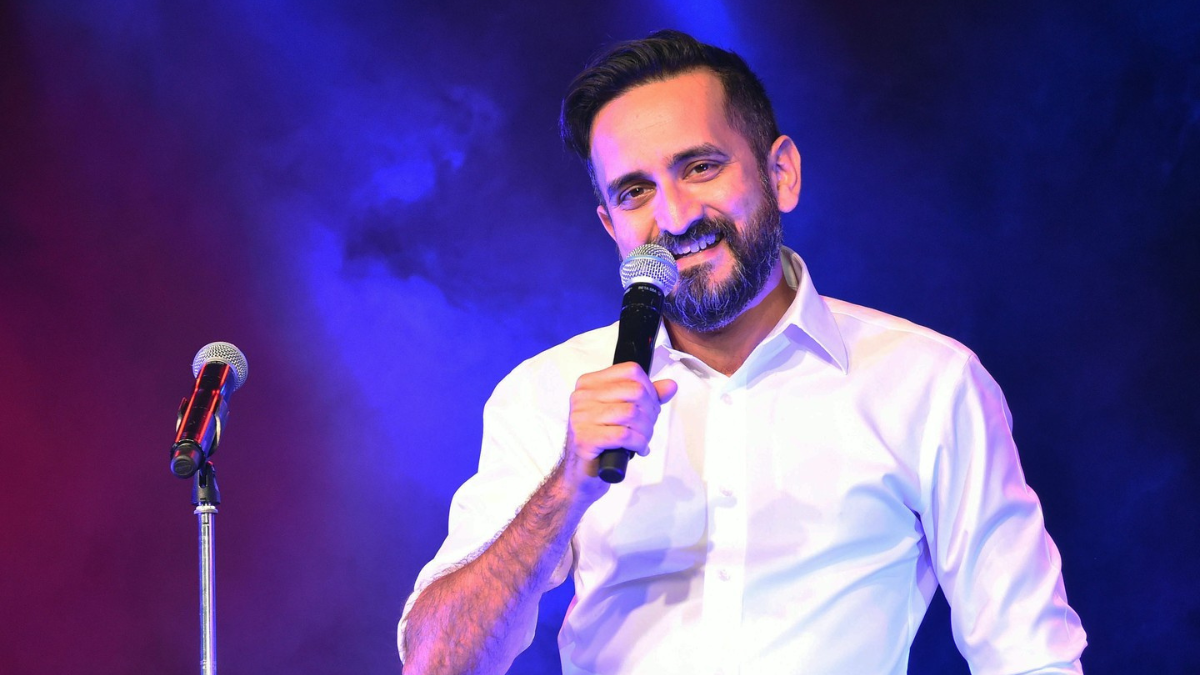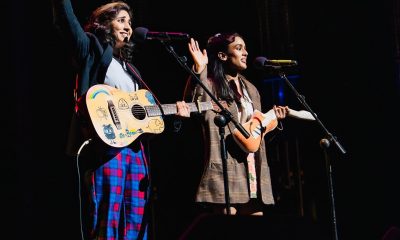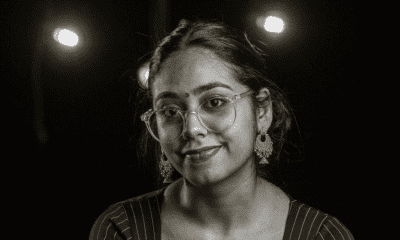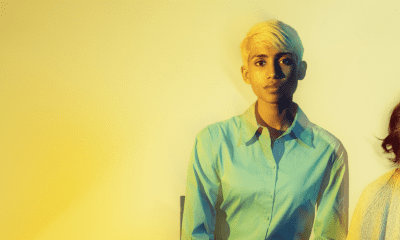Arts
Sami Shah On His New Show ‘Successful Comedian’, His Creative Process, and Diversity in the Arts and Media
A candid conversation with Pakistani-Australian comedian, writer, and broadcaster Sami Shah.

I saw Sami Shah for the first time at Comedy Republic Lower House—a cosy venue on Bourke Street, Melbourne. There were three brown folk in the audience and four in the room, if you count Sami. As a South Asian, and an immigrant like Sami, you can’t help but feel as if he’s inviting you into a conversation between old friends, where humour serves as both a bridge and a catalyst for deep reflection.
Sami’s journey from Karachi to Melbourne is a tale of resilience and reinvention. As an accomplished author and journalist, Sami has written for publications such as ABC and The Australian, and his moving memoir “I, Migrant” is an honest, humorous, and poignant account of his life as an immigrant. From gracing the stages of prestigious comedy festivals to hosting radio shows and podcasts, Sami has deftly proven his versatility in comedy, media and entertainment.
Brown Boy Magazine had the pleasure of speaking with Sami about his latest show, Successful Comedian, and his experiences navigating the complex terrain of race and representation in the arts and media. And in a world where cultural exchange is often reduced to social media sound bites, bite-sized food videos, and lunchtime yoga in the office, it’s rare to encounter a voice as unapologetically candid yet warmly empathetic as Sami Shah.
Sami Shah’s Successful Comedian runs at the Melbourne International Comedy Festival from 30 March to 23 April 2023 and then at the Sydney Comedy Festival from 27 April to 28 April. If your wallet permits, support Sami and other South Asian Australian comedians.
Brown Boy Magazine: CUCK had me in stitches, and Unappreciated took things to another level. Your comedy is clever and elegant, it “communicates ideas like racial politics”, and it makes South Asians feel ‘seen’. What can we expect from your new show, Successful Comedian? What’s it about, and what do you hope your audiences will take from it?
Sami Shah: Thank you, that means a lot to me for you to enjoy my work on the various levels I hope it gets understood and appreciated at. I don’t go into a show with a theme, at least not anymore. CUCK was particular because something specific had happened to me in the lead-up to that show, and so I wanted to make at least part of the show about that. If you watch or listen to it (the entire show is on Youtube and Spotify or Apple Music), you see most of the show is just standup about random things. Mostly to do with racial politics or migration because those are topics I’m always thinking about, but other things as well. It was only the last 15 minutes which were more themed, in a way. Unappreciated was more like what I enjoy doing, just coming up with stuff that I think is funny and then loosely organising it into an hour-long show. Successful Comedian is much like that. It’s got race, politics, migration, family, parenting, and all that stuff, but not in any sort of theme. Just whatever material stood the test of repeated trials over the course of one year.
That said, I do think you make an interesting point in your question. POC react to my shows very differently from white audiences. For white people, there are many uncomfortable spots they don’t understand or find funny, but POC connect with strongly. It’s because they relate to my perspective in a way white audiences can’t. And that’s okay, I like doing stuff that works for everyone, works for some, and doesn’t work for some. It makes the show interesting.
But, in Melbourne, at least, I’ve never been reviewed by a POC. I’ve never heard of a POC judge working for the festivals. And you can see that, I think, in the way reviews get written. The reviewers write things like, “He was doing his standard fare about race”, which they write about me, or Nazeem, or any POC comedian talking about race. But every white comedian’s show about anything that challenges them is seen as brave and bold and new and exciting. They just assume talking about race comes easily to POC comics, when in actuality, it’s a scary choice and being honest about it is extremely frightening and can have huge impacts on your career.
I don’t want to make it sound like I’m whinging, I’m hugely grateful for everything I’ve gotten in my career, and there are wonderful audiences who come back year after year, but I do think it’s getting noticeable that the people who review and judge what’s good and what isn’t, aren’t doing so from a non-white perspective at all.
BB: Is there an expectation for comedians to constantly churn out new jokes and punchlines for shows (and audiences)? What’s your creative process like, and what influences your comedy?
SS: There’s no expectation. I took two years off entirely when I was working at the ABC in 2018 and 2019, although I was miserable because I had severe FOMO, and I missed performing. I like writing a new hour every year because it’s fun and challenging, and I get bored of performing the same old material after a year or so.
My comedy, I like to think, represents my point of view and my point of view is always changing and growing, expanding and shrinking. My comedy should do the same. The process is living your life, and whenever something strikes a chord, you write it down in a notebook and then go to an open mic as soon as you can and try it out, work it out on stage.
That’s how I write anyway. The things that influence me are entirely other comedians. Ones I perform with, ones I watch online or listen to. I love stand-up comedy profoundly.
BB: What advice would you give to other South Asian writers and comedians? Do you think that, as South Asians Australians, we must work harder than the rest of the population?
SS: I don’t know if I have any advice that might be useful. What worked for me won’t work for anyone else, I’d think. It sounds like I’m being evasive, but I don’t intend it that way.
Do what you want and do it well. Fail, a lot. I have learned more from my many, many failures than I ever have from my successes. Be good to people who help you, and be good to people who don’t. No one likes an asshole, so don’t be one.
If you’re writing a book, finish writing it. There are a billion excuses as to why you can’t finish that first draft, and none of them hold up to scrutiny. If you’re doing comedy, gig as much as you can, and as hard as you can, but don’t expect to be great for a very long time. It takes comedians a decade to properly find their voice, I think, and another decade to figure out how to use it well. There’s no rush. Some people make it, some don’t. Life isn’t a meritocracy, there’s too much luck involved, and if it isn’t your turn, then it’s because you aren’t ready anyway. Do what you love, otherwise why bother doing it. Is that enough Desi uncle bullshit platitudes? Say thanks to God and eat your vegetables. I don’t know. Do drugs, get laid, live a fun life that you won’t look back at as boring.
And yeah, as a Desi you have to work harder than some others, but so does every other minority community. Working harder to succeed is good because it means everyone else will be more mediocre than you. They might still get the jobs you wanted, but you’re doing something you love, so why half-ass it anyway?
BB: You have performed for audiences across the world, and I remember reading about how Melbourne, for example, can be more ‘precious’ than other places. Have the reactions from your audiences differed depending on the location? Have you ever had to adapt or avoid a topic altogether, depending on the location?
SS: Melbourne is a great place for comedy because there are so many comedy clubs, and the comedy community is so supportive. It sucks, though, because the sensitive wokeness makes you want to punch people in their faces. They hate the idea of race.
The wokeness in Melbourne has made it actually harder to talk about race and racism because no one wants to have an honest conversation. And if you do talk about it, there’s this weird self-flagellating, boring, white guilt thing where as long as you tell them they’re all colonisers, they can clap and tell you how brave you are while they wear their Always Was, Always Will Be t-shirts, without knowing a single brown or black person in their personal lives. And I love it, because it means I get to make them uncomfortable.
I get to make audiences who think I’m only going to say what they agree with hate it when I say things they disagree with. Winning them over then is a challenge, and it makes me a better comedian. There really isn’t anything I won’t talk about. I’ve done the same shows in mining sites in WA and in clubs in Melbourne. I’m not interested in doing comedy I don’t want to do. If they don’t like it, oh well. It’s not mandatory for any audience to enjoy it, just as it isn’t mandatory for me to write universally appealing stuff. I wouldn’t even know how, nor do I trust anyone who claims they do.
BB: Can you tell us a bit more about your experiences with racism in your career? And what more do you think could be done in journalism, comedy, and broadcasting to ensure that it’s more diverse and inclusive?
SS: This would have to become a multi-chapter book with several sequels to get into my opinions on race and experiences with racism. Nor would it be a book worth reading or with anything new to add to the conversation. I don’t think there’s any single easy solution to the problem. I think diversity and inclusion is getting a lot better than it’s ever been before, so we should take time to be grateful for the hard work others have already put in and celebrate the victories. We don’t, and as a result, we think it’s the same as it’s always been. Still, I can guarantee that Kamahl has had a very different experience in Australian media than anyone in the current generation of performers.
Hire more people of colour, but stop making it look tokenistic, how’s that? Because when you do it, you treat us like tokens too, and that’s deeply unpleasant. There’s a lot wrong with how things are currently done, and I think many of the systems were put in place by well-meaning people who never bothered to check if their ideas are actually wanted by any people of colour or even if they work.
Learn to take criticisms about your blind spots. The recent example of The Age shitting their pants because someone asked for them to send a POC reviewer to a show about racial politics, then doing nothing to correct their complete lack of representation because that would be seen as some sort of mea culpa to their critics is the perfect example.
A lot of places love saying “decolonizing” and “diversity and inclusion”, and you look around the room, and it’s all white people using their yoga training to pat themselves on the back because they know how to pronounce Pho or do an acknowledgement of country every 30 seconds as part of their transcendental meditation mantra.
Every person in a decision-making position in the arts and media has used a lot of time and energy to accumulate a lot of power. Their journey wasn’t easy, but they truly resent the possibility of having to share that with anyone outside their own tribe, whether that tribe is based on race or sexuality or gender or whatever. But in the end, it’s still someone who, instead of opening doors wider for everyone, is only keeping it ajar just enough for their own. Hopefully, when more POC get into those positions, they won’t imitate the same behaviour, although I’m sceptical about that as well.
Buy tickets to Successful Comedian.
Brown Boy Magazine (@brownboyau) celebrates worship-worthy tastemakers and changemakers in the South Asian Australian diaspora (without taking itself too seriously).







